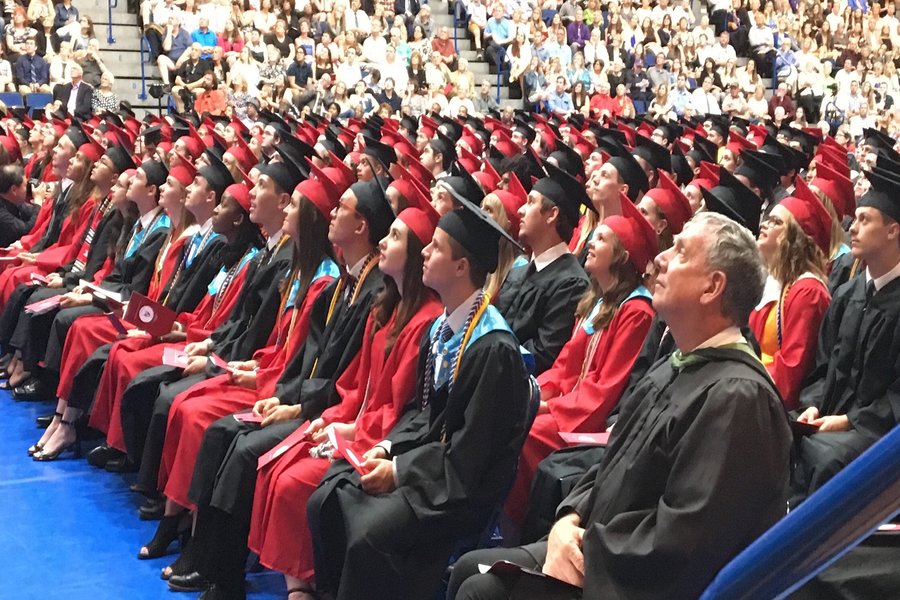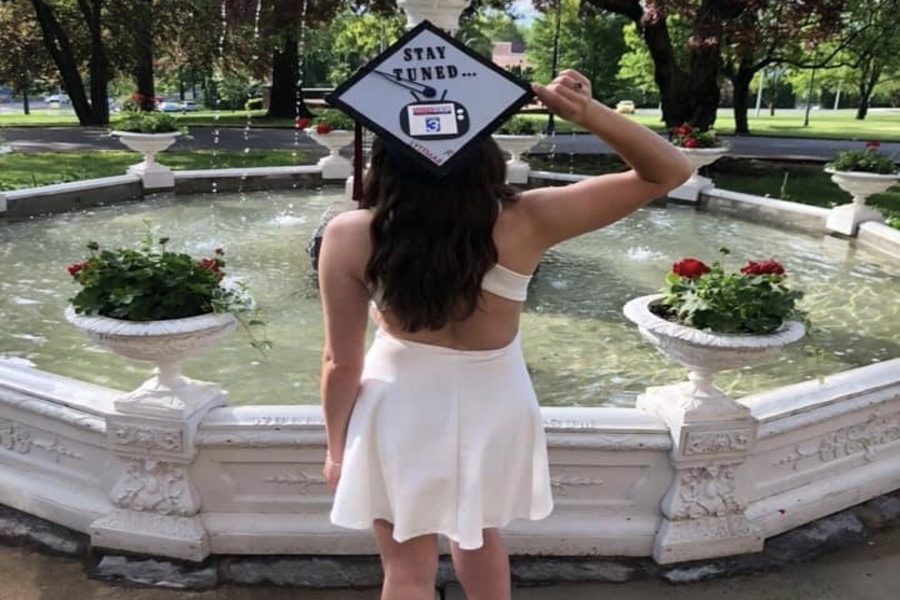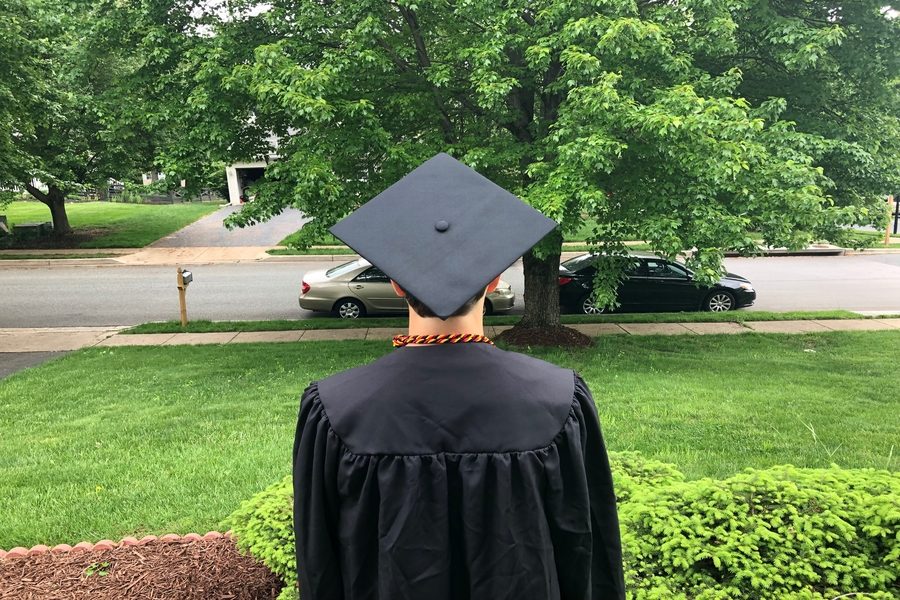Decorating a graduation cap: Pros and Cons
May 7, 2019
Express yourself by decorating a graduation cap
courtesy of Isabella Marcellino
Linganore alumni Isabella Marcellino showcasing her future broadcasting career at her Shippensburg graduation.
Dark pants, closed-toed shoes, graduation robe–we all have to look the same. Seniors don’t get to change anything about their graduation caps–except write their names inside. At LHS and all Frederick County schools, seniors are not allowed to decorate their caps.
I disagree with this rule. I think decorating a cap should not only be allowed, it should be encouraged. My opinion is among the majority. In a survey of 22 Linganore students 96% said that they would decorate their cap if given the option.
Not only would decorating graduation caps allow students to express themselves, but it would allow them to celebrate their achievements. Many students attend college following high school, and those who don’t, often pursue a trade. Allowing students to decorate their graduation caps would allow them to showcase their future plans.
“I would like to decorate my cap with a Linganore to Penn State design, to represent my next steps after graduation,” said MaKenzie Llewellyn class of 2019.
One reason cap decoration is prohibited is for uniformity among the students, but that argument is not strong. Despite students wearing red and black, the uniformity does not extend beyond that. Students wear cords awarded for achievements and stolls if they are members of honor societies. These colored accessories mean that not all students are uniform, and to prohibit cap decoration on that premise is inequitable.
A vast majority of students have the same opinion as me: 96% of students said that they do not think cap decoration would disrupt uniformity.
Many might think that cap decoration could create competition: Who has a brighter future? Who has achieved more? Who is more creative?
Really, it will even the playing field. Students who wear cords are already viewed as smarter or more accomplished, but this is not the case. Students without cords often excel, just in areas different than their peers. Allowing cap decoration would not create more competition. It would allow all students to showcase their best selves in a new way.
In a Lancer Media survey, 24% would decorate with pictures; 33% would decorate with a quote; and 33% would decorate with their future college, while others would decorate with things like their completer programs. In the survey, all students had some idea of what they would decorate on their cap to showcase themselves well, and since cap decoration is not required it would be no added stress or pressure.
In addition, the argument that students would decorate their caps inappropriately is not fair. Yes, trusting teenagers to decorate their caps is a risk, but to think that a senior would risk walking across state and go through the effort of adding something inappropriate to their cap is not reasonable.
And, checking graduation caps would not be as much of a burden as it is played out to be. Students are already being checked for contraband. Would it be that much of a burden to take an extra two seconds to ensure caps are appropriate?
Lastly, I argue that cap decoration is only a small reward for the hard work of students. At graduation, students get minimal recognition, rushing across the stage before the next name is called.
Cap decoration won’t change this, but might give students a new sense of celebration for their 13 years of hard work.
Decorating graduation caps? A wild idea that may lead to wild results
While it’s nice for students to be able to express themselves, the decoration of graduation caps has many cons that far outweigh the pros.
Graduation already is a hectic time of year. If students were allowed to decorate their caps, someone would need to check each individual cap. While I’d like to say that the students graduating wouldn’t break the guidelines given, there are people who would decorate their caps in an inappropriate manner.
Students even agree with this statement. In a Lancer Media survey, 72.7% said that there would be a problem with students decorating the caps inappropriately. Of those, 63.6% said these issues would be with select students, which would cause the need for everyone’s caps to be checked prior to graduation.
So who would check all of the caps? Would someone volunteer to do it? The entire event is staffed by faculty volunteers who would have to take on another burden of checking everyone’s cap. And more importantly, if someone put something crude or disrespectful on their cap, would their cap be taken away, or would they not be allowed to walk? Who would even decide what would be appropriate versus inappropriate?
Staff members agree. “If you allow seniors to decorate their caps then who decides what’s appropriate and inappropriate? So, if you have someone from the school deciding what’s appropriate or inappropriate, where are you drawing that line? It’s a really slippery slope, and it could potentially not be fair,” said social studies teacher Jamie Hendi.
Also, not every adult or person at the ceremony knows every symbol or the latest meme. It would be easy for a student to slip something inappropriate by a checkpoint if teachers were to check the caps.
While this is one of the problems that could seemingly easily be fixed, other issues with the decorating of caps exist and could be overlooked by people who want to decorate their caps.
With the decoration of graduation caps, some students could feel left out, especially if they can’t come up with an idea or if they aren’t artistic. Not every student knows exactly what they plan to do following high school, or even have any achievements that they would like to showcase during graduation.
Everyone graduating is equal because they are getting a high school diploma- even if some excelled in school, the diploma means the same.
Class of 2021 member Nicole Golemboski said, “I wouldn’t want to decorate my cap because I feel like mine wouldn’t be as good as other people’s, and that would stress me out.”
Most importantly, graduation is a uniform ceremony, and where while each student is individual and unique, graduation serves the purpose of celebrating the collective achievement of the class completing high school and moving on to the future. Decorating graduation caps could disrupt this uniformity of graduation.
Art teacher, Christian Madenspacher, is on the fence. While he does believe students should be able to express their individuality, “Graduation is a traditional and ceremonial practice.”
Students can find other times and places other than graduation to express their individuality and celebrate completing high school. This way graduation can stay professional and uniform. Why not decorate your cap AFTER the ceremony and take photos–better yet, students could buy two caps–one decorated for photos and the other plain.
Statements saying that honors society cords disrupt the uniformity of graduation are not valid. Cords from honors societies are made so that each cord has the same general look, just different colors to differentiate from the different honor societies. This showcases academic achievements while not disrupting the uniformity of graduation.
Students decorating their caps in different manners could not only cause graduation to appear informal due to clashing colors or objects added onto the caps, but some students could “steal the spotlight” from others if their caps are decorated differently.
Students decorating their graduation caps would cause issues, disrupt the ceremony’s uniformity, and therefore should not be allowed.



